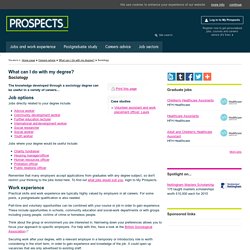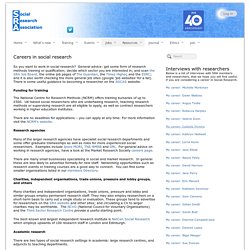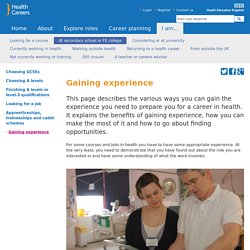

Sociology and Social Policy, School of. Sociology and Social Policy, School of Key measures: Positive Outcomes: 92.6%, Graduate prospects: 63.7%, Graduate employment: 52.5%

Downloads. Sociology degree career options. This guide should help you think about the skills you have, the jobs they can be applied to, and the options available.

You will have gained the ability to do the following things: think and act creatively maintain a flexible mind read pages of text and pick out the essential points conduct research and evaluate sources with a healthy scepticism lead and participate in discussions develop opinions, propose ideas and theories maintain objectivity, particularly towards other people play devil’s advocate have confidence in your opinions base conclusions on statistical research. A sociologist’s ability to form and defend an argument, regardless of personal opinions, could be helpful for a career in marketing. What can I do with my degree in sociology? The knowledge developed through a sociology degree can be useful in a variety of careers...

Job options Jobs directly related to your degree include: Jobs where your degree would be useful include: Remember that many employers accept applications from graduates with any degree subject, so don't restrict your thinking to the jobs listed here. To find out what jobs would suit you, login to My Prospects. What can I do with my degree in public administration and social policy? With a degree in public administration and social policy you can end up influencing the major decisions that affect us all Job options Jobs directly related to your degree include: Jobs where your degree would be useful include: Remember that many employers accept applications from graduates with any degree subject, so don't restrict your thinking to the jobs listed here.

To find out what jobs would suit you, log in to My Prospects. Work experience Sandwich course placements, internships, vacation visits and work experience are offered by some government departments. Career options for sociology graduates: top 10 tips. Dr Malcolm J Todd is the head of learning, teaching and graduate employability in the Faculty of Development and Society at Sheffield Hallam University.

He teaches sociology and is the author of publications on student learning, graduate employability and work experience. Malcolm is a trustee of The British Sociological Association Sociology graduates are found in a wide range of occupations: The Higher Education Academy in the UK produces student employability profiles for most subject areas in the UK and they note that sociology graduates are found in a wide range of occupations. What I think is relevant here is that many sociology graduates are attracted to careers that centre on the challenges and demands that members of a society face. This leads to jobs in social services, education, criminal justice, welfare services, government, counselling, charities and the voluntary sector.
Sociology is a good fit for a career in business: It is very hard out there just now. Subject Social Policy and Sociology. Careers in social research. Careers in social research So you want to work in social research?

General advice: get some form of research methods training or qualification; decide which sector you are interested in; and scan the SRA Job Board, the online job pages of The Guardian, the Times Higher, and the ESRC; and it is also worth checking the more general job sites (google ‘job websites’ for a list). There is some useful guidance to becoming a researcher on the AGCAS website. Funding for training The National Centre for Research Methods (NCRM) offers training bursaries of up to £500. UK-based social researchers who are undertaking research, teaching research methods or supervising research are all eligible to apply, as well as contract researchers working in higher education institutes.
15900 LCR Health Social Care Fact Sheet ART. Charity and voluntary work. 2903303-a-career-for-you-in-the-nhs-for-website.pdf. Gaining experience. This page describes the various ways you can gain the experience you need to prepare you for a career in health.

It explains the benefits of gaining experience, how you can make the most of it and how to go about finding opportunities. For some courses and jobs in health you have to have some appropriate experience. At the very least, you need to demonstrate that you have found out about the role you are interested in and have some understanding of what the work involves. Ways of getting experience Getting some relevant experience is one of the most important things you can do to help find a career in health, so take any opportunity you can. Work experience placements.
The greater and more varied the experience you have the better, so you could, for instance, do a placement as well as some volunteering. E-Library of Global Welfare. Social Policy Association. AQR: Association for Qualitative Research, UK and worldwide. The Directory of Qualitative Research, UK and Worldwide. The AQR Directory is the premier information resource for people searching for suppliers of qualitative services.

Each entry in the AQR Directory is placed into one of the following types of business found within the industry. Qualitative Research AgenciesA qualitative market research agency will offer most things relating to this area, from expert moderation to sensitive analysis and interpretation. Techniques and specialisation may vary by company, but many will use traditional and online approaches. Market Research AgenciesA market research agency may offer qualitative research, quantitative research, or both, and increasingly consultancy services, workshop facilitation and so on. Staffing can range from one or two individuals to several hundred, with specialist qualitative agencies often at the lower end of the spectrum. Freelance Qualitative Research ConsultantsResearchers may also operate independently from larger agencies, often working on their own or with at least one other.